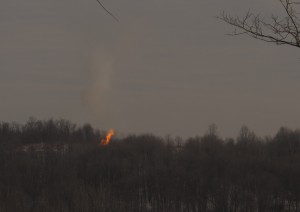Pa. DEP says radiation levels 'normal' after Greene County gas well fire

Katie Colaneri/ StateImpact Pennsylvania
A fire broke out on a Chevron natural gas well pad in Dunkard Township, Greene County, Pa. on Feb. 11.
The Department of Environmental Protection says residents were not exposed to unsafe levels of radiation in the days following last month’s explosion and fire on a Chevron natural gas well pad in Greene County.
On Feb. 13 and 14, the Bureau of Radiation Protection collected samples from three spots in Dunkard Township to make sure methane releases from the fire did not result in elevated radiation above normal, background levels, according to the department’s summary report released Friday.
“There is a certain amount of radon in natural gas,” says Scott Perry, DEP’s Deputy Secretary for Oil and Gas Management.
Radon is a radioactive, odorless, colorless gas. However, Perry says when natural gas is released into the atmosphere – as opposed to accumulating in an enclosed space – radon levels are generally not considered a threat to public health. (The DEP is conducting a study on radiation associated with natural gas development.)
Perry says the department tested for radiation in Dunkard Township “out of an abundance of caution.” The DEP has also finished sampling air quality and has started collecting soil samples in the area.
For more than one week after the fire that broke out on Feb. 11, methane gas spewed from two wells on the pad before specialized emergency crews were able to cap them. The official cause of the fire is still under investigation, but state officials say the release of methane may have been caused by a defect in one of the wellheads.
At the time, workers were preparing to put the wells into production. State police believe Ian McKee, a 27-year-old contractor on the site, died in the explosion.
The DEP’s Scott Perry says that every three days, inspectors with Chevron are checking wellheads at seven other pads across Pennsylvania that are in various stages of pre-production and where the pressure underground is higher than at producing well sites.
















